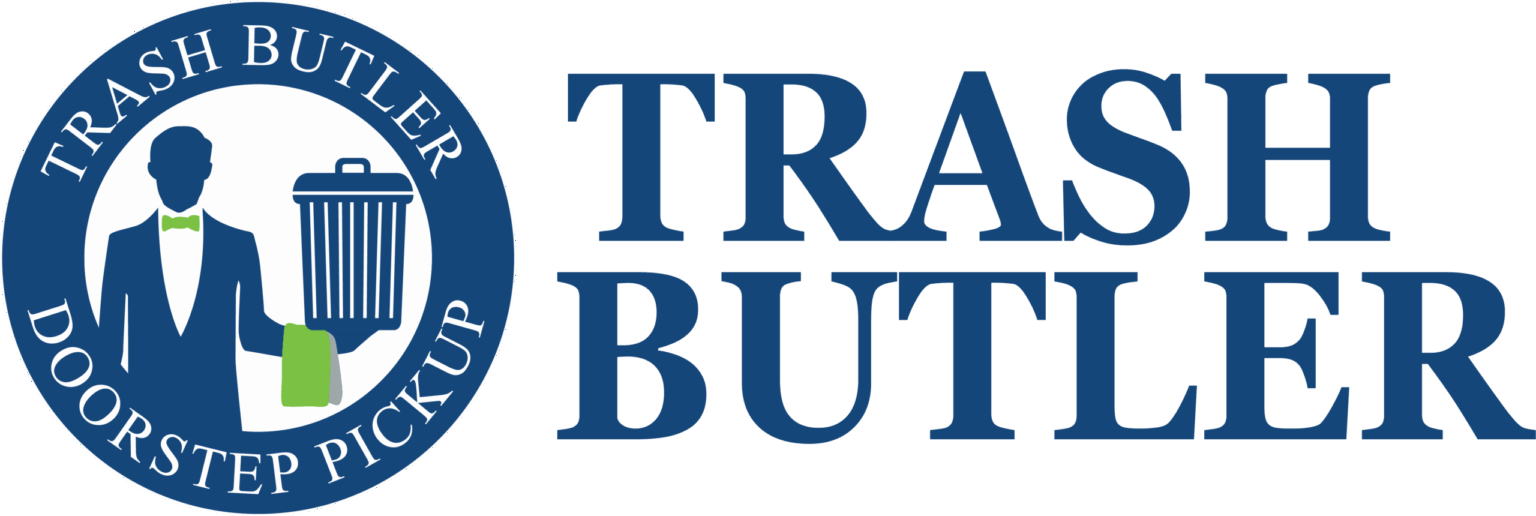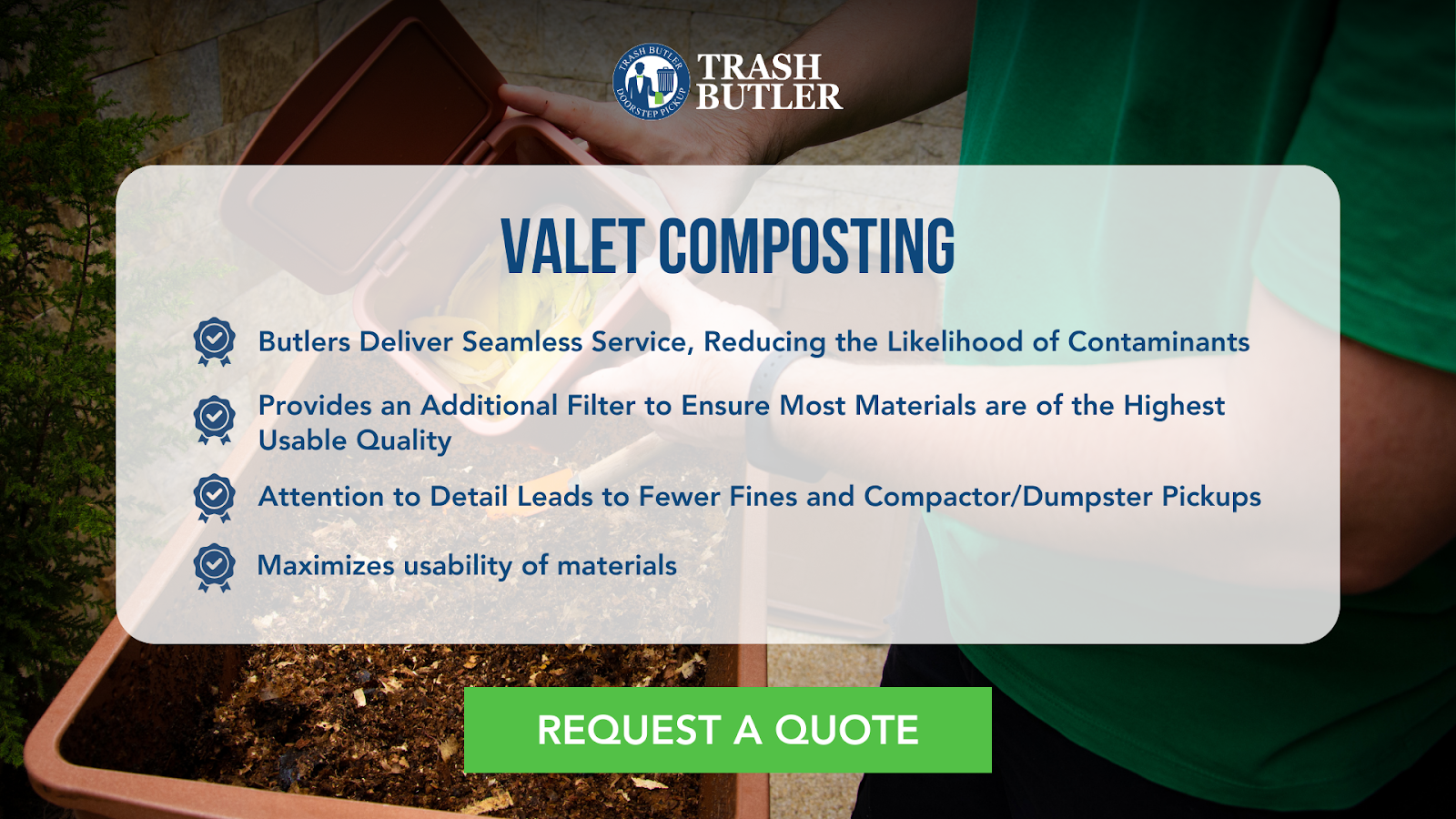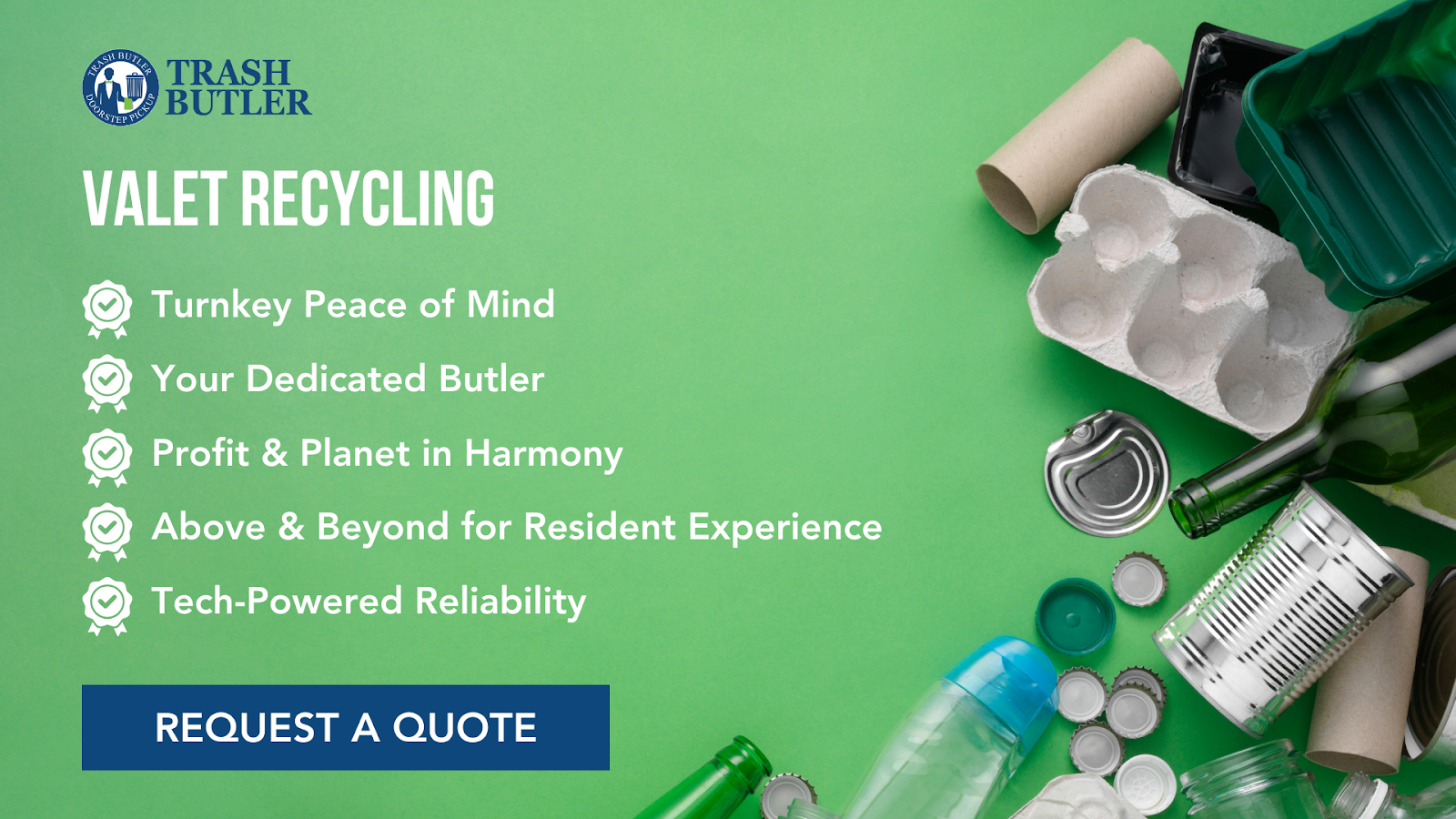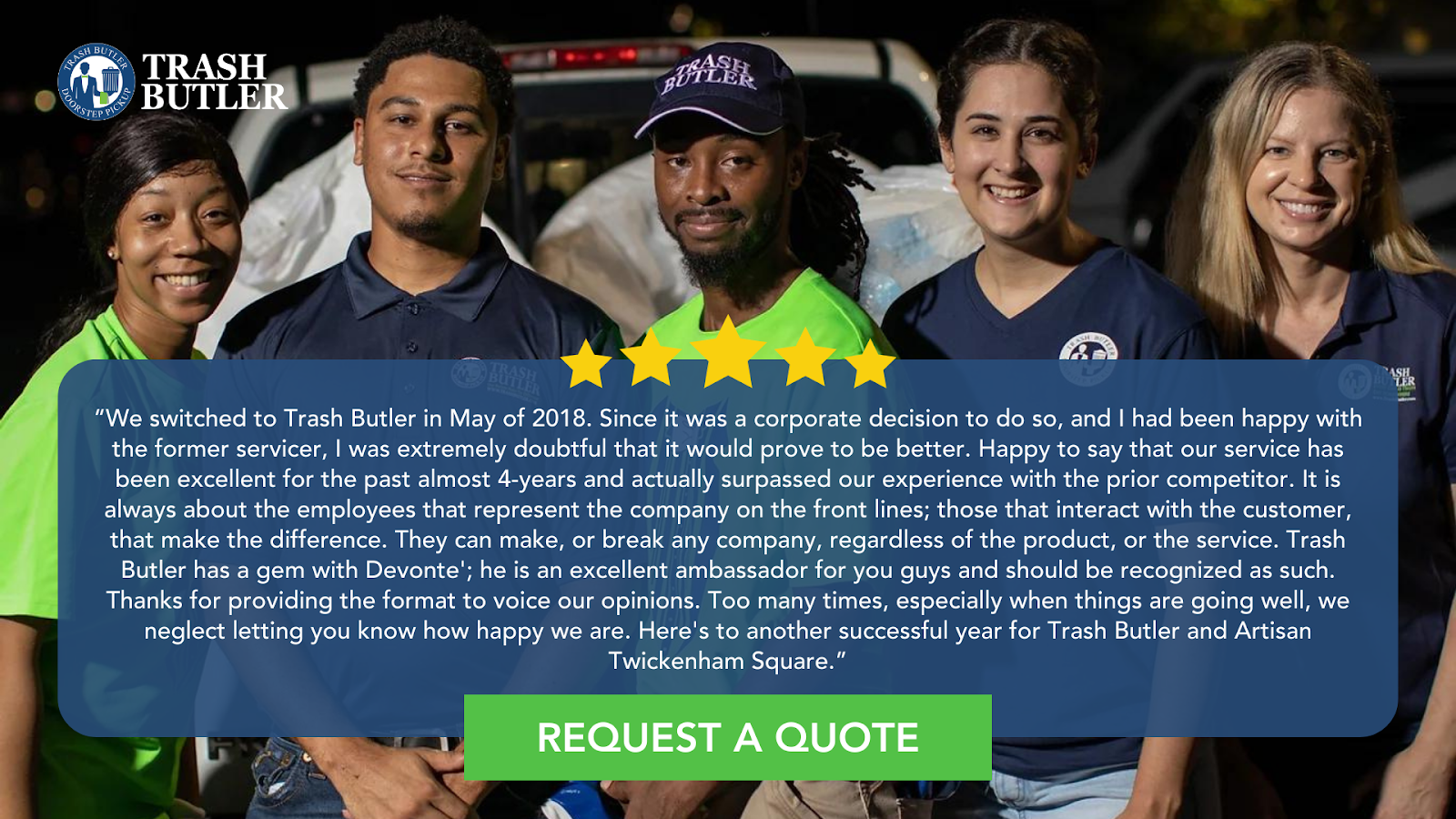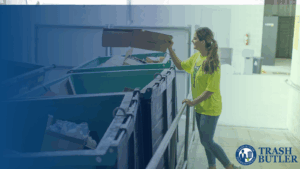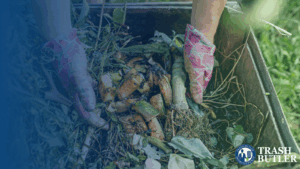Key Takeaways:
- Austin’s Universal Recycling Ordinance is a Mandate: Multi-family properties must provide composting services to comply with city law and avoid penalties.
- Resident Engagement is Crucial: Successful composting programs depend on clear communication, education, and making participation convenient for residents to prevent contamination.
- Partnering Simplifies Compliance: A service like Trash Butler™ provides a turnkey solution for managing the logistics, resident education, and reporting, ensuring properties can stay compliant with Austin composting regulations without added stress.
Austin’s commitment to sustainability makes composting more than a trend; it’s a citywide requirement. With new ordinances and eco-conscious residents expecting greener living spaces, multi-family properties must treat composting as a core part of property management. Yet, achieving compliance and community-wide participation can be challenging for managers who are already handling numerous responsibilities.
Fortunately, sustainability partners like Trash Butler make integrating Austin composting requirements into everyday living simple. By transforming waste management into a convenient, full-service amenity, we remove the hassle and guesswork from compliance.
This article outlines how multi-family properties can confidently approach composting, improving sustainability, resident satisfaction, and overall property value.
Understanding Austin’s Universal Recycling Ordinance For Organics
Austin is a city celebrated for its environmental leadership, and that reputation stems in part from its robust waste diversion initiatives. The Universal Recycling Ordinance (URO) is pivotal in shaping how multi-family properties handle waste, explicitly focusing on recycling and organic diversion. Understanding the URO requirements is crucial for property managers and residents in multi-family communities to stay compliant and contribute to the city’s zero waste goals.
What Does The Ordinance Require?
The URO mandates that all multi-family properties provide residents and employees access to recycling and organics diversion services. In this context, organics refers to compostable materials such as food scraps, coffee grounds, and some compostable paper products. These materials must be separated from landfill trash and collected for composting rather than disposal.
Who Needs To Comply?
All multi-family properties in Austin, including apartments, condos, and dormitories, must comply with the URO. Property managers are responsible for ensuring that residents have access to the correct information, collection bins, and regular service to divert both recyclables and compostable organics from landfills.
Key Steps For Multi-family Compliance
Property managers must provide labeled bins for recycling and compost, ensure regular pickup, and educate residents on proper sorting. Tracking participation and contamination rates also helps demonstrate compliance with city standards. Failing to meet these requirements can result in citations or fines under city regulations.
Challenges Multi-family Properties Face With Composting
Implementing a successful composting program in multi-family properties can be a significant undertaking. While the environmental benefits are clear, property managers and residents encounter unique challenges that can complicate compliance and participation.
Space Constraints
One of the most common barriers is limited space for compost bins and centralized collection points. Unlike single-family homes, apartments and condos frequently lack dedicated outdoor areas suitable for storing food scraps bins away from living spaces, making odor management and aesthetics a real concern.
Resident Engagement And Education
Composting programs require active resident participation and a basic understanding of what can and cannot be composted. Without ongoing education and clear signage, contamination rates can rise, undermining the program’s effectiveness and increasing operational costs.
Pests And Sanitation
Food waste collection inevitably raises concerns over pests, odors, and cleanliness. Without diligent maintenance and proper bin management, compost carts can attract rodents and insects, leading to resident complaints and potential health code violations.
Compliance With Austin Composting Ordinances
Austin’s Universal Recycling Ordinance (URO) sets specific standards for organics diversion in multi-family communities. Property managers must navigate the complexities of local regulations, track compliance, and generate reports, all while meeting residents’ expectations for convenience and sanitation.
How To Start A Composting Program In Your Austin Apartment Complex
Launching a composting initiative in your apartment community is a practical way to stay compliant with Austin composting regulations while supporting citywide sustainability efforts. Here’s how to make it happen seamlessly:
Assess Your Community’s Needs
Begin by evaluating the number of units, resident interest in composting, and existing recycling infrastructure. Understanding your community’s unique requirements will help shape an effective and engaging program.
Review Local Regulations
Familiarize yourself with Austin’s Universal Recycling and Organics Diversion ordinances. Ensure your proposed program meets the city’s composting requirements to avoid fines and keep your property eco-compliant.
Partner With A Professional Service
Look for valet waste services or composting partners experienced with multi-family properties. These services can facilitate regular, convenient organic collection and reduce contamination by offering resident education and clear guidelines.
Educate And Communicate With Residents
Host informational sessions or share digital resources to explain how to separate compostable items properly. Clear signage, FAQ sheets, and ongoing updates can boost participation and minimize mistakes.
Provide The Necessary Supplies
Make compost bins accessible in shared areas or offer personal starter kits for each unit. Be sure the containers are labeled clearly to prevent them from being mixed with landfills or recycled waste.
Monitor Progress And Gather Feedback
Track participation and regularly check for contamination issues. Survey residents for suggestions and troubleshoot any problems early. Continuous engagement ensures the program remains successful and residents stay motivated.
Meeting Austin Composting Regulations: Essential Steps For Property Managers
Austin’s Universal Recycling Ordinance (URO) mandates that all multi-family properties provide residents access to organics diversion, including composting. For property managers, staying compliant is about more than simply supplying bins. Here’s how to navigate the process effectively.
Understanding The Ordinance Requirements
Begin by familiarizing yourself with the city’s URO benchmarks, which require all multi-family communities to provide convenient access to compost collection. Ensure you’re clear on accepted materials, container standards, and tenant education obligations set by the City of Austin.
Setting Up Proper Composting Infrastructure
Assess your property’s layout and population to determine the right number and placement of composting containers. Containers should be easy for residents to access, properly labeled, and designed to minimize contamination with trash or recyclables.
Educating Residents And Staff
Successful compliance significantly depends on informed participation. Provide ongoing educational materials, signage, and instruction sessions for residents and maintenance staff. Clear communication helps minimize contamination and increases program success.
Tracking And Reporting Compliance
Keep accurate records of your composting efforts, including collection frequency, service providers, and resident engagement. Austin requires annual reporting, so maintaining detailed logs ensures you can respond quickly to city audits or information requests.
Maximizing Resident Participation In Your Austin Composting Program
Launching a successful Austin composting initiative in a multi-family community depends on more than providing bins. The key to compliance and sustainability is engaging residents, making participation simple, and keeping contamination rates low.
Clear And Consistent Communication
Start with clear, straightforward communication about what composting means for your community. Use community emails, posted flyers, and digital resident portals to outline which items are compostable, how pick-ups work, and why participation matters. Visual guides, multilingual materials, and regular reminders can help reach everyone.
Easy Access To Composting Resources
Convenience is an essential driver for resident engagement. Ensure composting bins are well-labeled and easy to locate—whether inside units, in hallways, or in designated disposal areas. Providing compostable liners or bags can further lower barriers to participation.
Education And Ongoing Support
Host workshops, distribute tutorials, or create short video demonstrations to educate new and existing residents. Offering “composting 101” sessions gives residents the knowledge and confidence to participate correctly and reduces the risk of contamination.
Feedback Loops And Resident Recognition
Encouraging feedback through surveys or suggestion boxes helps identify pain points and develop solutions tailored to your community. Recognize high participation rates through newsletters or community boards to foster a sense of shared achievement and ongoing engagement.
Integrating Composting With Existing Recycling And Trash Services
Integrating composting into your property’s current waste management system is crucial for maintaining compliance and supporting sustainability goals. A coordinated approach ensures a smooth adoption process for residents and staff while optimizing convenience and environmental benefits.
Assessing Your Current Waste Stream
Begin by analyzing existing trash and recycling practices. Identify high-volume organic waste sources, such as food scraps or landscape trimmings, to determine the potential for composting. Understanding these patterns streamlines the implementation of a composting program tailored to your community’s unique needs.
Coordinating Collection Logistics
Align compost collection schedules with existing trash and recycling pickups to minimize disruptions. Strategically place compost bins alongside trash and recycling receptacles in easily accessible areas to encourage resident participation and simplify property management.
Educating Resident And Staff Participants
Effective integration starts with education. Provide clear instructions on what can and cannot be composted, and use signage or digital reminders to reinforce proper sorting habits. Well-informed residents and staff are more likely to prevent contamination and maximize diversion rates.
Monitoring And Adjusting Processes
Continually track participation rates and contamination levels to spot improvement opportunities. Regular feedback from residents can uncover workflow adjustments or additional support needs, ensuring the composting program evolves in alignment with community behavior and compliance requirements.
Tracking Compliance And Reporting For Austin Composting Regulations
Staying compliant with Austin’s composting mandates involves more than setting up bins; it also involves ongoing monitoring and accurate reporting. Multi-family properties need reliable systems to ensure consistent participation, minimize contamination, and demonstrate adherence to local rules.
Understanding The Universal Recycling Ordinance
Austin’s Universal Recycling Ordinance requires multi-family communities to provide composting options alongside traditional waste and recycling. Property managers must keep clear records showing that services are provided and educational materials are distributed to residents.
Monitoring Participation And Contamination
To track compliance, managers should regularly monitor resident participation rates and check for contamination in compost bins. Establishing routine spot checks and documenting findings helps identify areas needing additional education or operational tweaks.
Reporting Requirements And Best Practices
The city requires annual waste diversion plans and occasional proof of compliance. Keeping organized logs, training records, and evidence of resident communications streamlines reporting. Leveraging simple digital tools or checklists can ensure no step is overlooked when submitting compliance documents.
Partnering With Trash Butler For Hassle-Free Composting Programs
Implementing an effective composting program in Austin’s multi-family properties doesn’t have to be overwhelming when you partner with Trash Butler. Our dedicated sustainability solutions simplify compliance, boost resident participation, and promote eco-conscious living throughout your community.
Seamless Onboarding And Program Customization
Every property is unique, so we tailor our composting programs to fit your community’s size, resident demographics, and existing infrastructure. Our streamlined onboarding ensures property managers and residents understand the program from day one.
Nightly Doorstep Collection For Maximum Convenience
Convenience drives participation. Our professional teams handle nightly doorstep compost pickups, removing the need for extra bins or transporting food waste. Residents simply place compostables outside their doors, making participation effortless.
Contamination Reduction Through Resident Education
We provide educational materials, digital resources, and on-site sessions to help residents understand what belongs in compost bins. This reduces contamination and strengthens Austin composting efforts across the community.
Ongoing Compliance Support And Reporting
Trash Butler tracks composting progress and provides detailed reports, helping property managers stay compliant with Austin’s Universal Recycling Ordinance and confidently meet sustainability goals.
Final Thoughts
Composting in Austin multi-family properties is no longer optional; it’s a requirement that benefits environmental, compliance, and resident satisfaction. By understanding the Universal Recycling Ordinance, implementing an accessible and educational program, and leveraging expert partners like Trash Butler, property managers can simplify compliance while elevating their community’s eco-friendly reputation. With proper planning and support, composting becomes an easy, sustainable amenity that residents appreciate and the city celebrates.
Request a Quote: Fill out a form to see how Trash Butler can benefit your community.
Read also:
- How Composting Services Can Help Properties Meet New Sustainability Standards
- Why More Cities Are Requiring Recycling Services In Apartment Complexes
- What Is SB 1383? A Simple Guide For Property Managers And Landlords
Frequently Asked Questions About Composting In Austin: How Multi-family Properties Can Stay Compliant And Sustainable
How can multi-family properties start a composting program?
Begin by assessing current waste practices and connecting with a local composting service like Trash Butler. We offer customized, nightly doorstep compost collection, resident education, and compliance tracking to make it simple to launch and maintain a program.
What items are acceptable in Austin’s compost collection?
Austin accepts food scraps, coffee grounds, tea bags, food-soiled paper, napkins, and yard trimmings in compost collection. Always check city guidelines or work with a sustainability expert to ensure compliance.
Are composting services mandatory for all multi-family units in Austin?
Yes, Austin’s Universal Recycling Ordinance (URO) requires multi-family properties to provide access to composting, recycling, and landfill services to help reduce waste sent to local landfills.
Can composting reduce overall waste disposal costs?
Yes. By diverting organics from landfill waste streams, properties often see a reduction in trash volume and associated disposal costs, maximizing budget efficiency for property managers.
What materials are prohibited from Austin’s compost bins?
Plastics, glass, metals, pet waste, styrofoam, and non-compostable packaging are strictly prohibited. Only approved food and yard waste materials should be placed in compost bins.
Does composting affect recycling practices at properties?
Composting complements recycling programs. Compostable materials reduce contamination rates in recycling bins when properly separated and help ensure both programs run efficiently and effectively.

